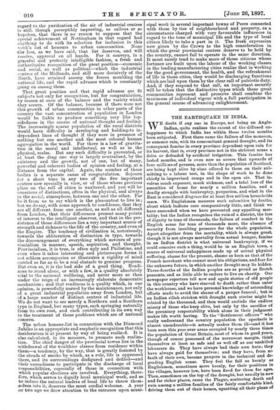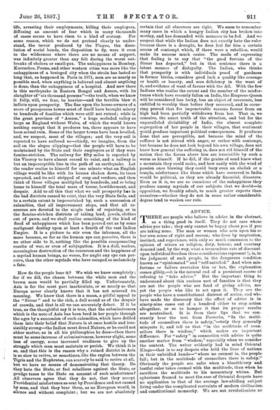THE EARTHQUAKE IN INDIA.
WE doubt if any one in Europe, not being an Anglo- Indian, quite realises the extent of the diffused un- happiness to which India has within these twelve months been subjected. First there came the failure of the monsoon, or summer rain, with its concomitant general drought, and its consequent famine in every province dependent upon rain for its harvest, that is, every province not in the strictest sense a delta or defended by artificial irrigation. This famine has lasted months, and is even now so severe that upwards of four millions of persons, more than the population of Scotland, are being kept alive by alms offered to them on their sub- mitting to a labour test, in the shape of work to be done chiefly in improvised camps and in the open air. That in- volves much exposure, much sickness, and a total loss of the amenities of home for nearly a million families, and a deadly struggle with bankruptcy, pauperism, and what in the East is considered disgrace for at least five million households more. We Englishmen measure such calamities by deaths, about which Indians care comparatively little, and think we have succeeded when we have prevented any appalling mor- tality; but the Indian recognises the ruin of a district, the loss of dignity to tens of thousands, the failure of comfort in the English sense for tens of thousands more, the absence of security from insulting pressure for the whole population. Apart altogether from the mortality, which is always great, though it is not always mortality from actual hunger, famine in an Indian district is what universal bankruptcy, if we could conceive such a thing, would be in an English town, a source of universal unhappiness made up of actual physical suffering, shame for the present, shame as keen as that of the French merchant who cannot meet his obligations, and fear for the unknown future, in Which another drought may lie hidden. Three-fourths of the Indian peoples are as proud as Scotch peasants, and as little able to endure to live on charity. Our newspaper reporters tell now and again stories of old people in this country who have starved to death rather than enter the workhouse, and we have personal knowledge of astounding efforts made to avoid the shame of a pauper funeral; but in an Indian zillah stricken with drought such stories might be related by the thousand, and then would exclude the endless misery of those who keep alive, but only by the sacrifice of the pecuniary respectability which alone in their judgment makes life worth having. To the "Settlement officers" who really understand the country population the spectacle is almost unendurable—it actually makes them ill—and it has been seen this year over areas occupied by nearly three times the population of Great Britain, most of whom in good years, though of course possessed of the narrowest margin, think themselves at least as safe and as well off as our unskilled labourers do. They have always had their own huts; they have always paid for themselves ; and they have, from no fault of their own, become paupers in the technical and de- grading English sense. They feel the fall as keenly as Englishmen, sometimes more keenly, for their positions in the villages, however low, have been fixed for them for ages. Then, sometimes on the top of the drought, but usually in new and far richer places, came the Plague, scattering death and ruin among a million families of the fairly comfortable kind, driving them out of their homes, upsetting all their plans of life, arresting their employments, killing their employers, diffusing an amount of fear which in many thousands of cases seems to have risen to a kind of ecstasy. For some reason, which we do not pretend clearly to under- stand, the terror produced by the Plague, the disso- lution of social bonds, the disposition to fly, were it even to the wilderness where there are no means of support, was infinitely greater than any felt during the worst out- breaks of cholera or small-pox. The unhappiness in Bombay, Kurrachee, Poona, and other western cities was more like the unhappiness of a besieged city when the strain has lasted so long that, as happened in Paris in 1871, men are as nearly as possible mad, when anything is believed and almost anything is done, than the unhappiness of a hospital. And now there is this earthquake in Eastern Bengal and Assam, with its slaughter of "six thousand persons "—the truth, when we know it fully, will, we fear, be heavier—and the terrible blow it inflicts upon prosperity. The fine upon the house-owners of a score of prosperous towns must of itself have brought misery to hundreds of families which were still not ruined; while in. the great province of "Assam," a huge secluded valley as large as England without Wales, of which the world knows nothing except that it produces tea, there appears to have been actual ruin. Some of the larger towns have been levelled, and, we suspect, most of the villages; and the very soil is reported to have suffered so—chiefly, we imagine, from the soil on the slopes slipping—that the people will have to be maintained by the State and their employers as if they were famine-stricken. The railway for fifty miles is reported by the Viceroy to have almost ceased to exist, and a railway is but an imperceptible line in the path of an earthquake. Let the reader realise to himself for one minute what an English village would be like with its houses shaken down, its trees uprooted, and its soil stripped of crop and verdure, and then think of those villages multiplied by hundreds, and so bring home to himself the total mass of terror, bewilderment, and despair. Add to all this that what we call prosperity has in the bad districts ceased to exist, that the very State feels, and to a certain extent is impoverished by, such a succession of calamities, that all improvement stops, and that all re- sources are devoted to the single task of repairing, or in the famine-stricken districts of taking land, jewels, clothes out of pawn, and we shall realise something of the kind of flood of unhappiness which has been poured out as by some malignant destiny upon at least a fourth of the vast Indian Empire. It is a picture to stir even the inhuman, all the more because, so far as the human eye can perceive, there is no other side to it, nothing like the possible compensating results of war, or even of subjugation. It is a dull, useless, meaningless destruction of the resources and the happiness of a myriad human beings, no worse, for aught any eye can per- ceive, than the other myriads who have escaped so melancholy a fate.
How do the people bear it P We wish we knew completely ; for if we did, the chasm between the white man and the brown man would be partially filled up. Unfortunately, Asia is for the most part inarticulate, or so nearly so that Europe never clearly knows that it has not misread its meaning. We know that there is a moan, a pitiful appeal to the " Sircar " and to the rich, a dull sound as of the despair of crowds, and that is all we can accurately detect. If it he true, as the thoughtful say it is true, that the submissiveness which is the note of Asia has been bred in her people through the ages by a succession of such calamities, which have drilled them into their belief that Nature is at once hostile and irre- sistibly strong—the Indian must dread Nature, or he could not abhor matter, as in all his philosophies he does—then there must be some increase of submissiveness, however slight, some loss of energy, some increased readiness to give up the struggle which man must maintain or perish. We think it is so, and that this is the reason why a ruined district in Asia is so slow to revive, or sometimes, like the region between the Tigris and the Euphrates, can scarcely be said to revive at all, but we have no means of demonstrating that theory. Do they hate the State, or feel rebellious against the State, or grudge taxes to the State on account of such misfortunes? All observers agree that they do not, that they accept Providential misfortunes as sent by Providence and not caused by man, and that they bear them, as no European would, in silence and without complaint ; but we are not absolutely certain that all observers are right. We seem to remember many cases in which a hungry Indian city has broken into. mutiny, and has demanded with menaces to be fed. And we suspect that while the Indian does not exactly hate the ruler because there is a drought, he does feel for him a certain access of contempt which, if there were a rebellion, wouldr make its success much easier. The mode of expressing. that feeling is to say that "the good fortune of the- Sircar has departed," but in that sentence there is a. latentmenace of disloyalty. The Indian, who thinks thatprosperity is with individuals proof of g•oodnesa in former births, considers good luck a quality like courage, or health or beauty, and sees deficiency in. the want of it, and evidence of want of favour with the All. With the few- Indians who realise the extent and the number of the misfor- tunes which have recently fallen on India, the Empress-Queen will be considered less lucky, less an object of reverende, less entitled to worship than before they occurred, and in occur- ring proved that for impenetrable reasons favour from on high had been partially withdrawn from her. That is, we' conceive, the exact truth of the situation, and but for the unparalleled divisibility of India, the almost complete' segregation of her people in their villages, that sentiment Vold produce important political consequences. It produces none that are perceptible, not because the mind of the sufferer is not stirred with anger, or rather with contempt, but because he does not look beyond his own village, does not know how general the suffering is, does not rid himself of the- notion that the forces above him are irresistible by such a worm as himself. If he did, if the grains of sand knew what a mountain they could make, and how easily with the wind of passion once blowing they could bury even an obelisk or a temple, misfortunes like those which have occurred in India. would be political, as they are already financial, disasters. Even as it is, we are so conscious of the unhappiness they produce among myriads of our subjects that we doubt—in, opposition, we frankly admit, to much greater experts than ourselves—whether they do not in some rather considerabk degree tend to weaken our rule.



















































 Previous page
Previous page